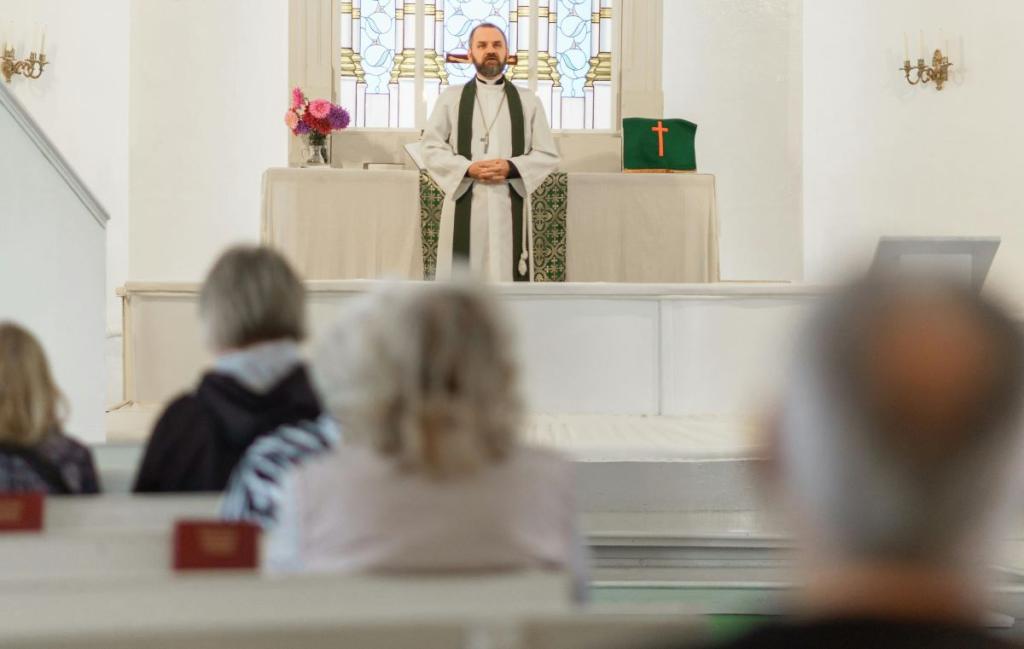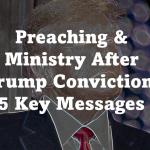Preaching 2024 election – what will clergy face and what issues will they address? My colleagues and I look at five issues and share insights from our research.

Supreme Court Rulings Have Affected Clergy Attention to Social Issues
Since Donald Trump began appointing conservative justices to the Supreme Court in 2017, the Court’s rulings have significantly affected the rights of marginalized groups and environmental protections. Key rulings include:
- Trump v. Hawaii (2017): Allowed broad executive power to exclude aliens from the U.S.
- Masterpiece Cakeshop v. Colorado Civil Rights Commission (2018): Supported a baker’s refusal to make a wedding cake for a same-sex couple due to religious objections.
- New York State Rifle & Pistol Association Inc. v. City of New York (2019): Limited state and local rights to regulate firearms.
- West Virginia v. Environmental Protection Agency (EPA) (2021): Restricted the EPA’s ability to regulate power plant emissions.
- Dobbs v. Jackson Women’s Health Organization (2022): Overturned Roe v. Wade, removing federal protection for abortion access.
How are these rulings shaping the ways clergy address – or avoid – certain social issues in their sermons?
My colleagues and I have been tracking how preachers are addressing social issues in sermons since 2017, and we believe many pastors will be tackling hot topics in 2024.
Canopy Forum invited us to write an article about this, which you can read here.
Briefly, we looked at how mainline Protestant clergy have navigated these legal and politically charged issues and their approaches as the 2024 presidential election approaches. Our surveys of mainline Protestant preachers from 2017 (n=782), 2021 (n=2,600), and 2023 (n=791) explore trends in preaching. For this article we focus on five: immigration, LGBTQIA+ rights, firearms, environmental issues, and abortion rights.
Survey Demographics
The surveys included clergy from eight mainline Protestant denominations across the U.S. Participants were evenly split by gender, predominantly white (89%), heterosexual (85%), and English-speaking (88%). Most identified as progressive/liberal (75%), with smaller proportions identifying as conservative (10%) or moderate (15%). Clergy served diverse congregations, from rural to urban settings, and from small to large congregations.
Preaching Trends and Issues
We found that clergy’s willingness to address controversial topics in sermons increased since Trump’s election:
- 2017: 31% frequently (>10 times/yr.) addressed controversial topics.
- 2021: 55%
- 2023: 47%
Willingness varied by gender, race, congregation location, and political orientation. For example, female clergy and those in conservative or rural congregations were more hesitant to address controversial topics.
Specific Issues Addressed
- Immigration: Willingness to preach on immigration declined from 60% in 2017 to 45% in 2021, likely due to changes in administration policies after the 2020 election and reduced urgency.
- LGBTQIA+ Rights: Preachers’ responses varied, influenced by denominational stances and regional legislation, such as anti-transgender laws.
- Firearms: Clergy in urban and racially diverse congregations were more likely to address gun violence than those in rural or predominantly white congregations.
- Environment and Climate Change: Environmental issues remained a high priority, influenced by the increasing frequency of catastrophic weather events.
- Abortion: Post-Dobbs, there was a three-fold increase in clergy addressing abortion, though many avoided the topic. Those who did preach about it often supported pro-choice perspectives.
Influences on Preaching
Three main factors influenced clergy’s willingness to address social issues:
- Societal Drivers: Broader societal issues affecting congregation members’ lives, such as the pandemic or mass shootings.
- Congregational Factors: Congregational unity, location, and feedback influenced clergy decisions. Preachers in divided congregations and those in rural areas showed less willingness to address controversial topics.
- Personal Factors: Clergy’s personal beliefs, sense of vocation, and stress levels affected their approach. Progressive clergy were more likely to preach on social issues.
Trends for Preaching in 2024
Based on what we’ve seen over the past seven year and what we’re seeing heading into the 2024 election, we have identified possible trends.
Immigration
Ongoing political actions and headlines around immigration may increase clergy willingness to address immigration issues. See Rev. Dr. Elizabeth’s argument published last month in Canopy Forum. She argues: “for those who claim the Bible’s teachings to be authoritative, the New Testament’s unified command to treat the stranger hospitably should be the lens used in considering matters around immigration.”
LGBTQIA+ Rights
Legislative actions will influence preaching on LGBTQIA+ issues. Denominations may matter in 2024, including the May 2024 United Methodist Church vote to allow LGBTQIA+ ordination.
Firearms
Rising gun violence will keep firearms regulation a pressing topic, with urban and racially diverse congregations leading the discussion. Internal drivers also determine preacher stances on guns. In the 2021 survey, we found that clergy who voted for Trump were more willing to talk about gun rights than their Biden-voting colleagues were to preach about gun regulations.
Environment and Climate Change
Climate disasters will continue to drive environmental preaching. Congregations often minister to those affected by these disasters while simultaneously trying to navigate their own way through them. Our survey results suggest clergy draw on biblical and theological resources to advocate for caring for God’s Creation in their sermons and move their congregations to support policies that would mitigate the worst effects of climate change.
Abortion
The fallout from the Dobbs decision will keep abortion a critical issue, with clergy navigating complex congregational dynamics. One respondent wrote, “I have not taken a dualistic stance on abortion aligned with voting but work to help congregants see beyond taking two sides and learn to understand more about the whole spectrum and talk with each other in ways that can bring understanding, and ways to talk with legislators that can be more effective.”
Conclusion
Mainline Protestant clergy navigate a complex interplay of societal, congregational, and personal factors when addressing social issues in sermons. As the 2024 election approaches, these influences will continue to shape the topics clergy choose to address, reflecting broader social changes and the evolving needs of their congregations.
Read the full article here: How Will Preachers Address Social Issues During the 2024 Election?
Canopy Forum is a digital publication from the Center for the Study of Law and Religion at Emory University that produces expert analysis for scholars, lawyers, clergy, journalists, policy makers, and the broader public. We seek to foster productive public discourse on critical issues at the intersection of law and religion – two of the most powerful and pervasive forces in societies around the world.
Read also:
Ideas for Clergy Dealing with Pre-Election Stress
Election Resources for Faith Leaders: Defend Democracy and Resist Tyranny

Rev. Dr. Leah D. Schade is the Associate Professor of Preaching and Worship at Lexington Theological Seminary in Kentucky. She has authored or co-edited six books, including Preaching in the Purple Zone: Ministry in the Red-Blue Divide (Rowman & Littlefield, 2019), and was project director for a grant funded by the Wabash Center for Teaching and Learning in Theology and Religion studying ministry, preaching, and social issues in theological education.

Wayne Thompson is Emeritus Professor of Sociology at Carthage College. Professor Thompson writes about religious organizations and their leaders. He held research positions with the Presbyterian Church (USA), the Evangelical Lutheran Church in America, and the Archdiocese of New York City before becoming a sociology professor. His doctorate is from University of Connecticut and master degree from University of Arizona, each in sociology with specialty in society and religion. Professor Thompson also writes about diversity, equity and inclusion topics for a newspaper syndicate.

Dr. Amanda Wilson Harper is a graduate school professor at Tarleton State University. She studies social justice engagement and how to foster communities to have hard conversations.













